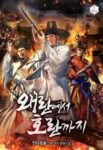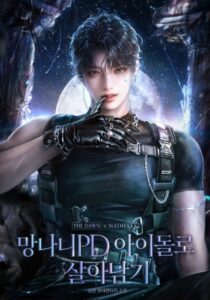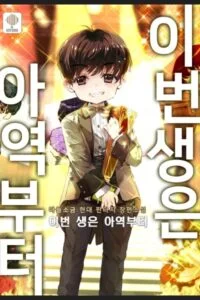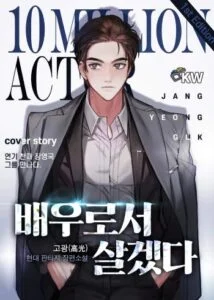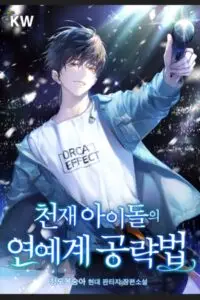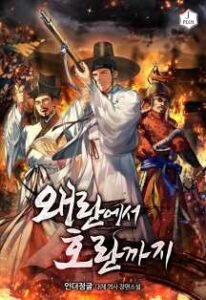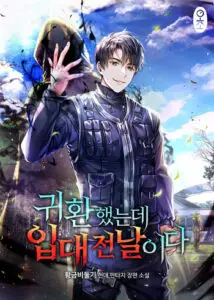After the War
The battle—no, our war had come to an end.
Before I fell into the Joseon era, a war broke out between Russia and Ukraine.
I heard news that several Russian soldiers were killed, and countless Ukrainian civilians were massacred.
But I just thought, “Ah, I see,” and moved on, like a reader of a web novel.
It was like reading a short story of roughly 5,000 characters.
The great comedian Charlie Chaplin once said, “Life is a tragedy when seen in close-up, but comedy in long-shot.”
Even at the moment when I tried to write a novel related to the Imjin War, I looked at the tragedy of war as a comedic material to sell to my readers.
But a war that I experienced firsthand?
It was horrifying.
As a writer, I had no other way to describe war than this word.
It was just horrifying.
The war took so much from us.
I lost my grandfather, but many others also lost their precious loved ones.
“Ughhhhh…”
“Are you alright?”
“Sweetheart, please open your eyes.”
It was Gaettong-ajeossi that I occasionally saw.
In her wife’s arms, Gaettong-ajeossi’s face appeared comfortable with his eyes closed.
“Ugh!”
Suddenly, I felt like vomiting.
Was I trying to make a profit out of this tragedy?
My heart ached as if it was being torn apart.
But I couldn’t look away.
This event could be the prologue of a novel or the intro to a movie.
The scenes penetrated my mind as if burned there by a branding iron.
“Father!”
Was Gaettong’s expression as he tearfully cried for his father the same as mine right now?
But I didn’t have the luxury to comfort Gaettong, either.
No, nobody in our front yard had the luxury of comforting Gaettong.
“Kuhaaa!”
“Sob, sob!”
“Kueeek!”
Animal-like cries could be heard here and there.
That’s right.
Our front yard had long been transformed into a massive funeral.
“…”
That’s when I realized.
War was hard, but the real difficulty was after the war ended!
I suddenly felt like I’ve been writing about war too easily.
How many people had died in my novels because of war?
If you were to count the people killed in my works, perhaps the job with the most lives taken in the world would be a writer.
I’ve been making a living by killing countless lives in my novels about war too easily.
In the novels I’ve written, the protagonist was usually a munchkin, so it wasn’t a big deal for hundreds or thousands of people to die at once.
But shamefully, I had never properly described the brutality of war.
The war I experienced firsthand was incredibly brutal.
It was so painful that I never wanted to experience it again.
“…”
Honestly, I have never lost a family member in an accident.
I haven’t even seen someone die in front of my eyes.
In a way, it was natural.
How many times would one witness a person being murdered in front of them in the 21st century?
I could confidently say that it would be very few times, if at all.
But in less than an hour, war took the lives of dozens of people.
Seeing that, reality seemed to fade away.
I saw a woman hugging and crying over a man whose neck had been severed.
He was the one who had taught me the true nature of this era.
She must be his wife.
“Sob, sob, sob.”
Watching the grieving woman made me truly feel the reality of Grandpa’s passing.
It felt suffocating, as if a heavy rock was placed on my chest.
When I thought of my grandfather who lost his life to enemy bullets, my vision blurred again.
“…”
I was staring blankly at the yard for a while when Father approached.
“Sangseung, are you alright?”
Father gently patted my shoulder.
Wiping my tears, I saw that his own eyes were red as well.
I’ve only been with them for a little over a year, and yet my heart ached so much.
My father barely showed any sign of sadness.
Was it because people of this era were used to such farewells?
No, could anyone really get used to farewells like this?
And with just a few hundred enemy soldiers, my grandfather was gone.
How will the Imjin War turn out?
Various questions pop up in my head.
But the biggest question was this.
“Father… What exactly is the family lineage grandfather spoke of?”
“…Family lineage. That’s a difficult question. When you can understand it, perhaps you’ll also understand what your grandfather meant.”
As always, my father didn’t give me a straight answer but an evasive one.
Today, I’ve gained many questions, but there was one thing I was certain of.
I had been wasting my life like an idiot.
I had been shadowboxing with my ancestors.
I had been trying to live discreetly just because the ancestors praised our family out of nowhere.
Yes, just like the “hidden power protagonist” that readers liked.
Up until now, I thought that acting like a protagonist in a novel was the most fitting stance for writing this story.
But that was a foolish move.
In just nine years—or rather, as there was not much time left this year—in eight years, there will be a great war that will go down in the history of the Korean Peninsula and world history.
But fearing my ancestors, I acted passively and wasted time by reassuring myself with thoughts like “It’s okay. If you’re a protagonist in a novel, things will go according to your plan in 10 years.”
Damn it!
I was stupid.
I was not the protagonist.
I was a writer who wrote novels.
But I unknowingly started acting like a protagonist.
This must not continue.
A writer should have control over the story.
Only then could the writer write the ending they desired.
Sometimes, among my fellow senior writers, they struggled with readers wanting a different story than the one they wanted to write, and so they ended up with an unintended ending.
But no matter what, I must see the ending I wanted.
Fortunately, the ending I wanted was the readers’ favorite “happy ending,” like the fairy tale protagonists who “lived happily ever after.”
I couldn’t keep acting like this to achieve that.
I had to take a more proactive approach.
I regretted not realizing this sooner.
It was only after losing someone precious that I could even begin to grasp the reality of the Imjin War.
This incident was probably just the tip of the iceberg.
I had no idea if more serious things would happen in the Imjin War.
It could be losing my father, mother, or Soyul, who were all worriedly looking at me right now.
Losing Grandpa was already too much…
I didn’t want to experience this sadness twice.
Never!
I had to put words into action.
“Father, I’ll just go outside for a moment.”
“No, you can’t. There might be some Japanese hiding out there.”
“I have something I have to do right now.”
“…Hyeonmyeong.”
“Yes, brother.”
“I’ll take care of Sangseung. Go and try to fix this situation.”
“Understood.”
Under the protection of my youngest uncle, I arrived at the rice paddies where the Japanese soldiers were scattered.
The smell of blood here was as strong as in our yard.
“Why did you come here, of all places?”
“I’m looking for something.”
“For something?”
It was something I couldn’t do if it weren’t for the moment when the Joseon Army had left to fight the Japanese.
I had to find the key while the sunset still illuminated the ground.
That key were the Japanese rifles.
I didn’t know how on earth the Japanese managed to have dozens of those expensive rifles, but I had to collect them before they were handed over to the government.
Among the disorderly scattered bodies, I found a Japanese with one of my arrows stuck in his eye.
“…”
That arrow was definitely the one I shot.
I recognized it because Grandpa personally made me a quiver using black bamboo.
I felt mixed emotions knowing that my arrow had pierced him.
If only I had shot the arrow just a little bit faster, my grandfather would still be alive—
No, I should have learned archery more diligently.
If I had, I could have drawn the bowstring as naturally as my youngest uncle did.
“… So, it’s this guy.”
“Yes.”
“If I had killed this guy in one shot…”
It seemed that my youngest uncle was feeling the same emotion as me.
Fortunately, the rifle I was looking for was on that man’s shoulder.
“At least you found what you were looking for.”
I groaned and took the rifle from the soldier’s body.
“Isn’t this the gun the Japanese were using? Did you come all the way here to find this?”
“Yes, Grandpa passed away because of this, so I decided to learn about it.”
“…That’s right. The problem isn’t the tool, but those who used it. Let me help you.”
With my youngest uncle’s help, who seemed to be able to easily handle three to five hundred rifles, the work of collecting the rifles was finished in no time.
In this vast field, there were about twenty rifles scattered around.
I gathered them all and returned home with my youngest uncle.
“…”
Now was the time to figure out how to proceed with this damn novel.
Funeral
“When will they~ come back~”
“Ayo~ Where did they go~”
The whole village, no, the entire Ulsan turned into a funeral hall.
The small coastal villages, barely twenty households each, were turned into ruins.
On top of that, 57 people died fighting the foreign invaders.
Among them were my grandfather, and the man who always smiled brightly at me when he left the house, Gaettong-ajeossi, or rather, Chunsam.
As I recalled those we lost in this invasion, my vision blurred once again.
These damn tear ducts had no intention of being fixed.
“Oppa, are you crying?”
“Sniff, huh? No, I’m not crying.”
At an age when it was still difficult to understand death, perhaps Soyul wouldn’t remember this day when she finally grows up.
That fact made me even sadder.
Grandpa loved his grandchildren.
So much that it wouldn’t hurt even if he put them in his eyes!
The thought of Soyul not even remembering this fact made me even more heartbroken.
Deep sadness could be seen on the faces of the slaves who helped with the funeral.
“Father!”
My pregnant mother cried enough to cause concern.
Father stayed by her side, making sure she didn’t collapse, supporting her as she wept.
With great effort, a handful of dirt was placed into the grave.
Handful by handful.
As the sun began to set, the grave was finally completed.
Thus, Grandpa was laid to rest in our family’s mountain, and the funeral was over.
I sat alone in my room, scribbling notes.
In my notebook, there were writings of works that someone might have seen at least once during their school days.
A name that’s shattered into pieces!
A name dispersed in the void!
A name that has no owner, even when called!
A name that could kill me as I call it out![1]
Kim Sowol’s poem, “Evocation,” was a piece I had learned just to pass an exam at school.
Drip! Drip! Drip!
Squeeeeeak!
The screeching noise struck my eardrums as if to wake me up.
“Only today… only today! I’ll let myself grieve.”
[1] The full poem:
A name that’s shattered into pieces!
A name dispersed in the void!
A name that has no owner, even when called!
A name that could kill me as I call it out!
The words left in my heart
I could not even finish uttering
O the precious one I loved!
O the precious one I loved!
The red sun hangs on the western mountain ridge.
The herd of deer mourns sadly.
From the mountain peak where I sit,
I call out your name.
With sorrow, over and over, I call
With sorrow, over and over, I call.
My calling echoes, but
The space between the sky and earth is too vast.
Even if I turn into a stone in this place,
A name that could kill me as I call it out!
O the precious one I loved!
O the precious one I loved!

